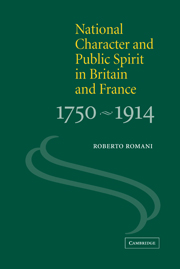Book contents
- Frontmatter
- Contents
- Acknowledgements
- List of abbreviations
- Introduction
- Part I 1750–1850
- 1 All Montesquieu's sons: the place of esprit général, caractère national, and mœurs in French political philosophy, 1748–1789
- 2 After the Revolution: Staël on political morality
- 3 From republicanism to industrialism and national character: Melchiorre Gioja, Charles Dupin, and Continental political economy, 1800–1848
- 4 The French Restoration dispute over mores and Tocqueville
- 5 Between Whiggism and the science of manners: Britain, 1750–1800
- 6 British views on Irish national character, 1800–1846
- Part II 1850–1914
- Conclusion
- Index
6 - British views on Irish national character, 1800–1846
Published online by Cambridge University Press: 22 September 2009
- Frontmatter
- Contents
- Acknowledgements
- List of abbreviations
- Introduction
- Part I 1750–1850
- 1 All Montesquieu's sons: the place of esprit général, caractère national, and mœurs in French political philosophy, 1748–1789
- 2 After the Revolution: Staël on political morality
- 3 From republicanism to industrialism and national character: Melchiorre Gioja, Charles Dupin, and Continental political economy, 1800–1848
- 4 The French Restoration dispute over mores and Tocqueville
- 5 Between Whiggism and the science of manners: Britain, 1750–1800
- 6 British views on Irish national character, 1800–1846
- Part II 1850–1914
- Conclusion
- Index
Summary
Introduction
Despite the long-standing reputation of the Victorians for showing contempt towards the Irish, recent scholarship has drawn a more complex and nuanced picture which acts as a liberating insight for my research. I aim to extend this reassessment back to the hitherto under-documented period between the Act of Union and the Famine, and in the process to argue that, in discussing Irish character, early and mid-nineteenth-century British authors made use of a theme that was central to their political universe, the relationship between a free constitution and the moral adequacy of its citizens. The Irish case provides a vantage point from which to survey the varying ways in which this relationship was upheld.
In accordance with nineteenth-century usage, what is meant by the term ‘Irish character’ is the traits and attitudes exclusively of the Irish peasantry. The psychological traits and the detectable behaviour that made up the ‘Irish character’ were not in question at the time. All agreed on its warm-heartedness, inquisitiveness, and social disposition; whereas, on the dark side, its indolence, proneness to fight and riot, inclination to lawlessness, and lack of forward thinking were commonly mentioned. Even the Irish writers, Protestant and Catholic, added little substantial to the stereotype, which, however, marked a significant step beyond the ‘wild Irishman’ whose echoes still resound through Hume's History of England. The perceived image of the Irish had in fact undergone a slight but decisive shift over the course of the eighteenth century.
- Type
- Chapter
- Information
- Publisher: Cambridge University PressPrint publication year: 2001



